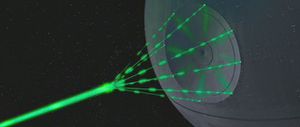Difference between revisions of "Superlaser"
(Corrected spelling/grammar and added information on the nature of the beam) |
m (de-stub) |
||
| (One intermediate revision by the same user not shown) | |||
| Line 1: | Line 1: | ||
'''Superlasers''' are the strongest-known [[turbolaser]]-like beams used in [[Star Wars]]. Superlaser technology is extremely scalable and multiple superlasers capable of destroying planets have been created by the [[Galactic Empire]]. Superlasers are best-known for their role as the primary weapons of [[Death Star]]s, though much smaller and less-powerful versions exist, such as the ball turrets found on [[LAAT]] military transports. | [[Image:DeathStar3.jpg|thumb|right|And [[Alderaan]] is toast.]]'''Superlasers''' are the strongest-known [[turbolaser]]-like beams used in [[Star Wars]]. Superlaser technology is extremely scalable and multiple superlasers capable of destroying planets have been created by the [[Galactic Empire]]. Superlasers are best-known for their role as the primary weapons of [[Death Star]]s, though much smaller and less-powerful versions exist, such as the ball turrets found on [[LAAT]] military transports. | ||
== Nature == | == Nature == | ||
A superlaser beam is created from smaller tributary beams. The beams typically combine to form the full-power beam at some point outside of the main emitters. The beam may be held at the collection point for a moment before the final beam is released. The mechanism to hold and redirect the beams is not specified. | A superlaser beam is created from smaller tributary beams. The beams typically combine to form the full-power beam at some point outside of the main emitters. The beam may be held at the collection point for a moment before the final beam is released. The mechanism to hold and redirect the beams is not specified. | ||
| Line 9: | Line 8: | ||
According to the novel ''Death Star'', the beams on the superlaser mounted on the first Death Star must be carefully monitored and attuned. Otherwise, they may cause feedback along the beam shaft that could potentially unleash the destructive power of the weapon to what ever it is mounted on, turning it into spacedust in a heartbeat. Due to this the system on the Death Star had automatic fail-safes that were at least triple-redundant | According to the novel ''Death Star'', the beams on the superlaser mounted on the first Death Star must be carefully monitored and attuned. Otherwise, they may cause feedback along the beam shaft that could potentially unleash the destructive power of the weapon to what ever it is mounted on, turning it into spacedust in a heartbeat. Due to this the system on the Death Star had automatic fail-safes that were at least triple-redundant | ||
[[Category:Star Wars]] | [[Category:Star Wars]] | ||
[[Category:SW Starship Offense]] | [[Category:SW Starship Offense]] | ||
Latest revision as of 13:26, 24 June 2008

Superlasers are the strongest-known turbolaser-like beams used in Star Wars. Superlaser technology is extremely scalable and multiple superlasers capable of destroying planets have been created by the Galactic Empire. Superlasers are best-known for their role as the primary weapons of Death Stars, though much smaller and less-powerful versions exist, such as the ball turrets found on LAAT military transports.
Nature
A superlaser beam is created from smaller tributary beams. The beams typically combine to form the full-power beam at some point outside of the main emitters. The beam may be held at the collection point for a moment before the final beam is released. The mechanism to hold and redirect the beams is not specified.
Death Star Superlaser
According to the novel Death Star, the beams on the superlaser mounted on the first Death Star must be carefully monitored and attuned. Otherwise, they may cause feedback along the beam shaft that could potentially unleash the destructive power of the weapon to what ever it is mounted on, turning it into spacedust in a heartbeat. Due to this the system on the Death Star had automatic fail-safes that were at least triple-redundant